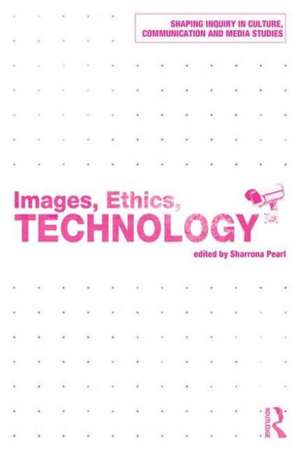Images, Ethics, Technology: Shaping Inquiry in Culture, Communication and Media Studies
Editat de Sharrona Pearlen Limba Engleză Paperback – 14 oct 2015
It emphasises how images change not only through their modes of representation, but through our relationship to them. In order to understand images, we must understand how they are produced, communicated, and displayed.
Each of the 14 essays chart the relationship to technology as part of a larger complex social and cultural matrix, highlighting how these relations constrain and enable notions of responsibility with respect to images and what they represent. They demonstrate that as technology develops and changes, the images themselves change, not just with respect to content, but in the very meanings and indices they produce.
This is a collection that not only asks: who speaks for the art? But also: who speaks for the witnesses, the cameras, the documented, the landscape, the institutional platforms, the taboos, those wishing to be forgotten, those being seen and the experience of viewing itself?
Images, Ethics, Technology is ideal for advanced level students and researchers in media and communications, visual culture and cultural studies.
| Toate formatele și edițiile | Preț | Express |
|---|---|---|
| Paperback (1) | 157.88 lei 6-8 săpt. | |
| Taylor & Francis – 14 oct 2015 | 157.88 lei 6-8 săpt. | |
| Hardback (1) | 669.94 lei 6-8 săpt. | |
| Taylor & Francis – 26 oct 2015 | 669.94 lei 6-8 săpt. |
Preț: 157.88 lei
Preț vechi: 191.70 lei
-18% Nou
Puncte Express: 237
Preț estimativ în valută:
30.22€ • 31.46$ • 25.54£
30.22€ • 31.46$ • 25.54£
Carte tipărită la comandă
Livrare economică 10-24 martie
Preluare comenzi: 021 569.72.76
Specificații
ISBN-13: 9781138935150
ISBN-10: 1138935158
Pagini: 222
Ilustrații: 52 black & white illustrations, 52 black & white halftones
Dimensiuni: 156 x 234 x 13 mm
Greutate: 0.32 kg
Ediția:1
Editura: Taylor & Francis
Colecția Routledge
Seria Shaping Inquiry in Culture, Communication and Media Studies
Locul publicării:Oxford, United Kingdom
ISBN-10: 1138935158
Pagini: 222
Ilustrații: 52 black & white illustrations, 52 black & white halftones
Dimensiuni: 156 x 234 x 13 mm
Greutate: 0.32 kg
Ediția:1
Editura: Taylor & Francis
Colecția Routledge
Seria Shaping Inquiry in Culture, Communication and Media Studies
Locul publicării:Oxford, United Kingdom
Public țintă
Postgraduate and UndergraduateCuprins
Introduction
- Relating ImagesSharrona Pearl
Section I: Authorizing Images - Introduction: Interrogating the Authority of the ImageNora Draper
- Technologies of Bystanding: Learning to See Like a BystanderCarrie A. Rentschler
- Professionalizing Police Media Work: Surveillance Video and the Forensic SensibilityKelly Gates
- Collision in a CourtroomConstance Penley
- "Who speaks for the art?"Larry Gross
Section II: Memorializing Images - Introduction: Residual/Visual: Images and their SpectersKevin Gotkin
- Facebook Photography and the Demise of Kodak and PolaroidMarita Sturken
- Forgiving without Forgetting: Contending with Digital MemoryIra Wagman
- Ambiguity, Cinema and the Digital Documentary ImageRoderick Coover
Section III: Embodying Images - Introduction: Subjectification as Embodiment; Subjectification is EmbodimentAlexandra Sastre and Nicholas Gilewicz
- The Autonomy of the Eye: Neuro-politics and Population in Design and CyberneticsOrit Halpern
- Sensory Topographies of Wind and Power in KansasLisa Cartwright and Steven Rubin
- The Face as a Medium
Notă biografică
Sharrona Pearl is Assistant Professor at the Annenberg School for Communication, University of Pennsylvania. Her first book, About Faces: Physiognomy in Nineteenth-Century Britain, was published by Harvard University Press in 2010. She is currently working on a book entitled Face/On: Face Transplants and the Ethics of the Other.
Descriere
Images, Ethics, Technology explores the changing ethical implications of images and the ways they are communicated and understood.
This is a collection that not only asks: who speaks for the art? But also: who speaks for the witnesses, the cameras, the documented, the landscape, the institutional platforms, the taboos, those wishing to be forgotten, those being seen and the experience of viewing itself?
Each essay explores how images change not only through their modes of representation, but through our relationship to them and emphasises that in order to understand images, we must understand our relationship to them and how they are produced, communicated, and displayed.
This is a collection that not only asks: who speaks for the art? But also: who speaks for the witnesses, the cameras, the documented, the landscape, the institutional platforms, the taboos, those wishing to be forgotten, those being seen and the experience of viewing itself?
Each essay explores how images change not only through their modes of representation, but through our relationship to them and emphasises that in order to understand images, we must understand our relationship to them and how they are produced, communicated, and displayed.






















